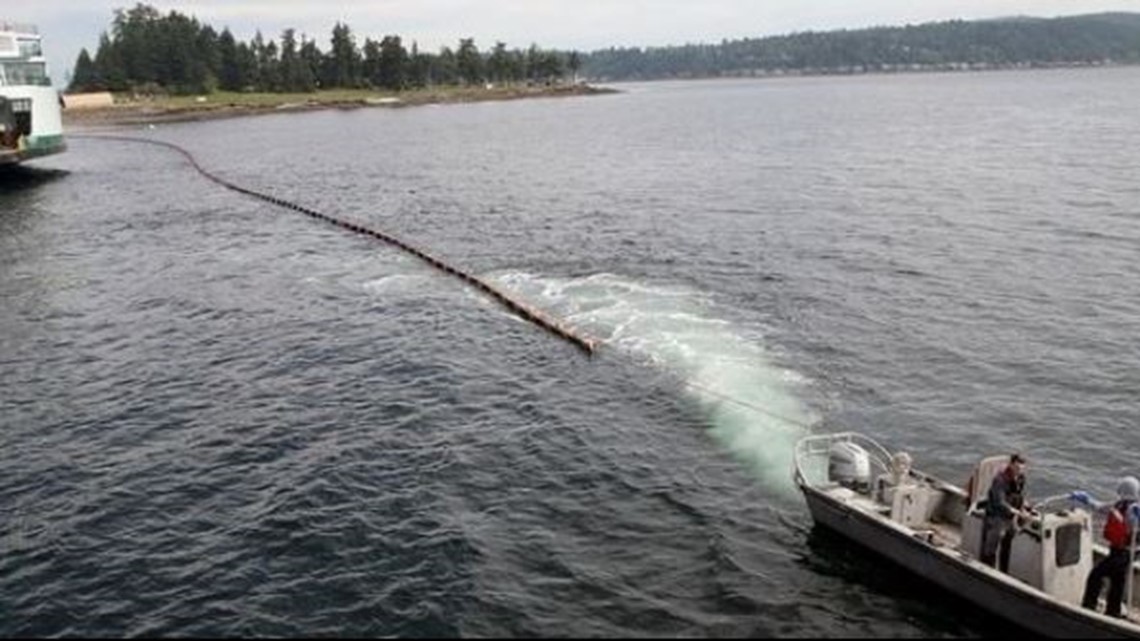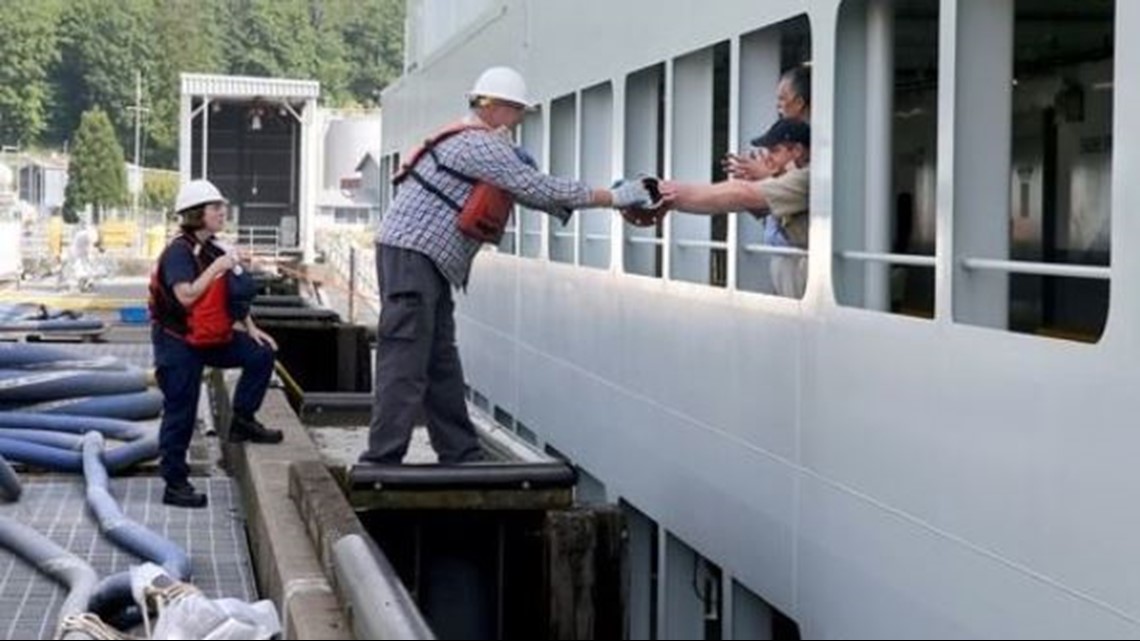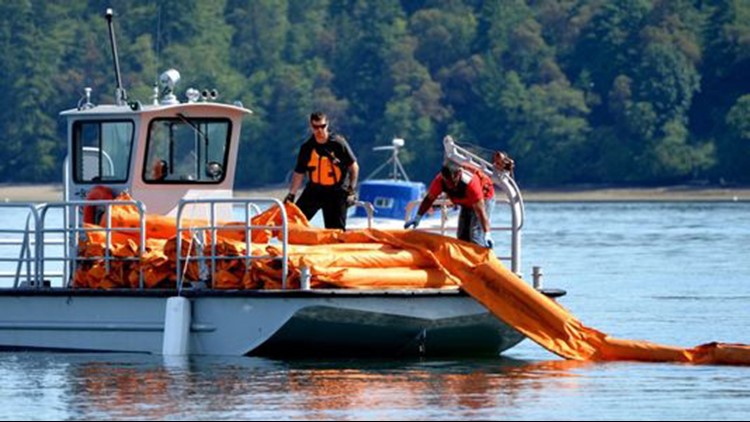Just after 5:30 a.m., personnel at the Navy's Manchester Fuel Depot discovered a valve on an underground storage tank had failed and almost one million gallons of fuel had spilled into Puget Sound.
Or rather that was the "worst-case scenario" envisioned in a drill the Navy conducted last Thursday.
The fuel depot, which is a part of Naval Base Kitsap, borders 1.5 miles of Kitsap County shoreline. The depot provides military-grade fuel, lubricants and additives to U.S. Navy and Coast Guard vessels, and to those from allied nations like Canada.
The fuel depot has capacity to store 79 million gallons of fuel -- the equivalent of approximately 1,200 gas stations, according to Glenn Schmitt, regional fuels manager with Naval Supply Systems Command Fleet Logistics Center Puget Sound.
More than 20 agencies to took part in the Navy's exercise this year. Representatives from the Navy, the U.S. Coast Guard, the Suquamish Tribe, the Washington Department of Ecology and Kitsap County Department of Emergency Management, among others, put their heads together to test just what a joint response to a spill of that magnitude would look like.
The Department of Ecology requires organizations and businesses that deal with bulk petroleum products to develop a spill response plan that must be reviewed and approved by the state.
Organizations are required to test their response plan three times a year: Twice by deploying response equipment, such a oil booms and spill skimmers, and once by running a table-top analysis of the plan. Every three years, the state requires a worst-case scenario drill to practice just how effective that plan is.
"Compared with other states, Washington state is probably the toughest state to get a plan approved and to pass a drill," said David Byers, the Department of Ecology's on-scene spill response coordinator. "That really makes Washington a very unique place and one of the most prepared places anywhere in the nation."
The Navy's scenario this year involved the accidental release of 750,000 gallons of JP-5, a type of carrier jet fuel, into Puget Sound from one of Manchester's underground storage tanks after a valve in one of the tank's pipelines down to the water failed.
"It's a very unlikely scenario," said Tammy Brown, who was acting as the response coordinator for Navy Region Northwest. "A lot of things would have to go wrong for that to happen."
Such an incident would impact an estimated 3.4 miles of Kitsap County shoreline. Marine wildlife, particularly juvenile fish, would be in danger of ingesting the potentially fatal toxic components of the fuel. Residents in communities neighboring the depot could be at risk of inhaling fumes from the evaporating fuel. Ferries would have to halt operations until the spill was under control.
If that scenario sounds drastic, that's because it is intentionally crafted that way. When creating the scenario, the designers look to take a simulated emergency a few steps further than what the most probable spill scenario would entail.


"We come up with a scenario itself that could happen, but then we push it to the most ridiculous thing," said Jason McMillan with Kitsap County Department of Emergency Management. "We've got this 750,000 gallon spill, oh, and aliens are landing out in the parking lot, now what are we going to do?"
That way, agencies will be prepared to respond to anything.
"If we're ready for the stuff that wouldn't happen, then we're ready for the stuff that could happen," McMillan said.
The type of fuel used in this year's scenario, JP-5, is a type of light jet fuel used by Navy aircraft launching off of a vessel. It has unique properties that mitigate foreseeable long-term environmental impacts in the event of a spill, but requires a prompt response if such an incident arises, Brown said.
"With the lightness of the fuel, a lot of it will evaporate and naturally dissipate," Brown said. "The good part is it's not here long term and it'll be gone in a few days. You'll see pockets of it, but there won't be a big concentrations like there would be with heavier fuels, but it could still damage out of the environment so that's why we want to get it out of the water."
The particulars of this year's scenario allowed the agencies to practice a variety of aspects of their emergency response, such as figuring out the most effective method to remove that type of fuel from the water, how to respond to potential impacts to the environment and wildlife in the spill area and how to craft effective public messages about the on-going clean-up efforts.
These sort of skills will beneficial to respond to any sort of fuel spill in Puget Sound, regardless of the source, Brown said.


"Something could happen with a vessel or something else out there that could result in a spill of this size, so we have to be prepared to respond," she said. "We don't think it could ever be this tank, but it could be this large, so we have to prepare for this size."
Perhaps one of the most beneficial aspects of a training exercise of this magnitude is the opportunity to practice inter-agency cooperation across the various echelons of federal, tribal, state and local jurisdictions before an a real-life incident arises.
"We've all got plans and we've got procedures, which is great, but they're less useful if we don't practice them with our partners," McMillan said. "I can read the Navy's plan all day long, but unless I see them and work with them in action, I'm not really sure how it's going to look and how it's going to effect the community. This is going to help me do my job better."



